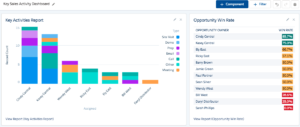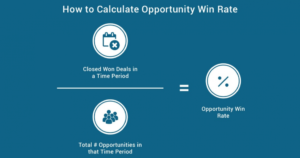8 Metrics You Should Track to Measure Sales Productivity
In this post, you learn how best to measure sales productivity in your organization. Sales productivity is the rate at which sales reps achieve their sales targets. Tracking sales productivity determines which sales reps are delivering the most bang for the buck and which could be making better use of their time.
As you’ll soon discover, there are several metrics you can measure to track sales productivity – read on to learn more.
Why Are Metrics Important for Measuring Sales Productivity?
Do you know which sales reps are your most productive? To determine this, you need to measure their performance in several ways. You can’t manage what you can’t measure, after all.
That’s where sales productivity metrics come in. These metrics enable sales management to measure, understand, and help improve the performance of their sales reps. By tracking the right metrics management can determine which reps are:
- Closing the most deals
- Closing the biggest deals
- Converting the most leads
- Making best use of their time
- Best retaining their customers
- Meeting or exceeding their goals
In short, sales metrics help you measure the productivity of all your sales reps. This helps you better manage the entire sales team – and makes your best reps even more productive.
The following video offers some advice on how to improve sales productivity.
Which Metrics Should You Track to Measure Sales Productivity?
The challenge in measuring sales performance is selecting the right metrics to track. If you’re using Salesforce or another CRM platform you collect a wealth of data about your sales and your reps – so much data that it can become overwhelming.
Which metrics are truly essential to tracking sales productivity?
Here are eight key metrics you should be tracking to measure the productivity of your sales force. Taken together they will help you determine who are your most productive performers.
Percent of Time Spent on Selling Activities
This first metric is perhaps the most difficult to track but also one of the most important. The reality is that most salespeople spend just 36% of their time on selling. The bulk of their time is spent on less-impactful activities, such as attending meetings and performing administrative tasks. If a sales rep can spend less time on non-selling activities and more time selling, that rep will have higher productivity – and make more sales.
How to track your sales reps’ time? Salesforce lets you track the activities of individual reps in the Key Sales Activity Dashboard. This will show you what each individual rep is doing – and no doubt reveal that the reps who spend more time selling have a higher win rate.
Conversion Rate
Another important metric to track is the conversion rate, which measures the percentage of leads that become actual customers. In general, the higher the conversion rate the more productive a rep is, although this can be affected by the quality of the leads generated. High-quality leads should, at least in theory, result in a higher conversion rate than lower-quality leads.
Conversion rates also vary by industry, so use this metric in conjunction with other metrics to determine the overall productivity of your reps. You can also track this metric over time to see whether a rep’s productivity is improving or declining.
Opportunity Win Rate
Opportunity win rate is similar to the conversion rate with some differences. The win rate is the ratio of deals a rep closes to the number of viable opportunities presented. A more productive rep should have a higher win rate, assuming that opportunities are equally viable. A rep chasing less-viable opportunities will have a lower win rate – as will one that is less skilled at closing.
Length of Sales Process
How long it takes a rep to close a sale is also a good measurement of productivity. Measure the length of time between receiving a lead and closing the sale. The less time it takes, the more efficient and thus productive the rep is – knowing, of course, that every customer and every deal is different. This is one best measured as an average.
Revenue Generated
Salesforce and other CRM platforms make it easy to track the revenue generated by each sales rep. While this is an important metric, it is only one part of the sales productivity measurement. The rep that generates the most revenue is a good rep but may not be the most productive. Use this metric in conjunction with other metrics to best determine productivity – and to track different types of revenue (new business, upsells and cross-sells, repeat customers, and so forth).
Average Deal Size
Some reps close a lot of small deals. Some close a few large deals. To determine sales productivity, it’s important to track the average deal size as well as the total revenue generated. This will also help you identify reps who are going after low-hanging fruit – or overly relying on a handful of large customers.
Retention Rate
Sales reps who retain customers are more productive than ones who continuously pursue new ones. While new business is important, revenue generated from existing customers is more profitable – and helps make a rep more productive.
Customer Lifetime Value
Finally, it’s important to measure the lifetime value of each customer. Customer lifetime value (CLV) measures the total revenue generated by a customer over that customer’s lifetime with your firm. Reps who cultivate their best customers generate the highest CLV and are among your most productive and profitable.
Let Rainmaker Help You Increase Sales Productivity
All of these key metrics help you measure the sales productivity of your team and Rainmaker can help you track them. Our Salesforce experts have years of experience in helping companies like yours improve their sales productivity.
We offer a wide variety of Salesforce Managed Services that help you measure sales productivity and power up your sales force. Let us help your sales team be more productive – and more profitable for you.
Contact Rainmaker today to learn more about increasing your sales productivity!








